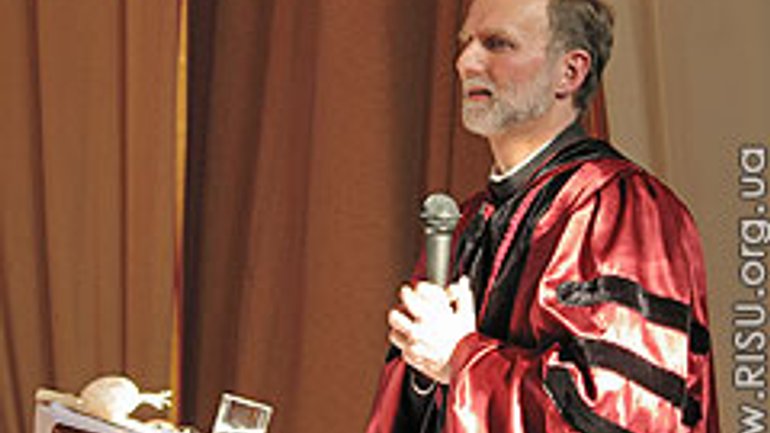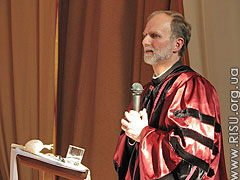Rector of UCU Publishes Account of the Attempt of Security Service of Ukraine to Put Pressure on the University’s Administration

 LVIV – The rector of the Ukrainian Catholic University shared with the general public in Ukraine and abroad his memorandum about the visit to UCU of the Security Service of Ukraine (SBU) agent responsible for contacts with Churches, which took place on May 18. The conversation of the SBU agent with the rector lasted for 40 minutes, after which Fr. Borys Gudziak, Ph.D., declared that “UCU will be subject to particular attention and possible pressure in the coming months.” He also noted the importance for the solidarity of the international community and, especially, the academic world, so that the university can defend its principled position in intellectual and social freedom.
LVIV – The rector of the Ukrainian Catholic University shared with the general public in Ukraine and abroad his memorandum about the visit to UCU of the Security Service of Ukraine (SBU) agent responsible for contacts with Churches, which took place on May 18. The conversation of the SBU agent with the rector lasted for 40 minutes, after which Fr. Borys Gudziak, Ph.D., declared that “UCU will be subject to particular attention and possible pressure in the coming months.” He also noted the importance for the solidarity of the international community and, especially, the academic world, so that the university can defend its principled position in intellectual and social freedom.
The SBU agent visited UCU in response to the students’ participation in protests against the new government. He warned the rector about what the students can expect and stressed the responsibility of the administration of the institution.
The agent “in a polite manner the agent related that certain political parties are planning protests and demonstrations regarding the controversial (and in some cases inflammatory) policies of the new Ukrainian authorities. Students are to be engaged in these protests. There is a danger that some of these manifestations may be marred by provocations. He stated that, of course, students are allowed to protest but that they should be warned by the university administration that those involved in any illegal activities will be prosecuted. Illegal activities include not only violent acts but also, for example, pickets blocking access to the work place of government officials (or any protests that are not sanctioned by authorities),” states Fr. Borys Gudziak, Ph.D.
“After his oral presentation the agent put on the table between us an unfolded one-page letter that was addressed to me. He asked me to read the letter and then acknowledge with a signature my familiarity with its contents. He stated that after I had read and signed the letter it would be necessary for him to take the letter back. Since I could see that the document was properly addressed to me as rector (I also noticed that it had two signatures giving it a particularly official character) I replied calmly that any letter addressed to me becomes my property and should stay with me -- at least in copy form. Only under these conditions could I agree to even read the letter (much less sign),” continues Fr. Borys.
After the rector’s response, in the presence of the rector the SBU agent made a call on his mobile phone to consult with his superior. The superior refused permission to leave the original letter or a copy with Fr. Borys.
Next, the rector refused to read the contents of the letter, let alone sign it.
Borys Gudziak testifies that the agent of the SBU was evidently taken back by his response and said that “he is not used to such a reaction.” “He had explained to me that he works with clergy on a regular basis. It could be assumed that other clergy (who work with youth, students, etc.) have been approached and that they have not refused to sign such documents,” continued father rector.
As a result, the rector of UCU in his memorandum clearly explained that UCU firmly holds its position on freedom and openness, and that it will do everything possible to resist such encroachment on freedom.
“Speaking and writing openly about these issues is the most peaceful and effective manner of counteracting efforts to secretly control and intimidate students and citizens. As was apparent during this incident, state authorities are particularly sensitive about publicity regarding their activity. Information can have a preemptory, corrective, and curing role when it comes to planned actions to circumscribe civic freedom, democracy, and the basic dignity of human beings,” notes the rector of UCU.









